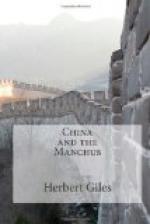After the further capture of Chinkiang, a feat which created a considerable panic at Shanghai, a force was detached from the main body of the T`ai-p`ings, and dispatched north for no less a purpose than the capture of Peking. Apparently a fool-hardy project, it was one that came nearer to realization than the most sanguine outsider could possibly have expected. The army reached Tientsin, which is only eighty miles from the capital; but when there, a slight reverse, together with other unexplained reasons, resulted in a return (1855) of the troops without having accomplished their object. Meanwhile, the comparative ease with which the T`ai-p`ings had set the Manchus at defiance, and continued to hold their own, encouraged various outbreaks in other parts of the empire; until at length more systematic efforts were made to put a stop to the present impossible condition of affairs.
Opportunity just now was rather on the side of the Imperialists, as the futile expedition to Peking had left the rebels in a somewhat aimless state, not quite knowing what to do next. It is true that they were busy spreading the T`ai-p`ing conception of Christianity, in establishing schools, and preparing an educational literature to meet the exigencies of the time. They achieved the latter object by building anew on the lines, but not in the spirit, of the old. Thus the Trimetrical Classic, the famous schoolboy’s handbook, a veritable guide to knowledge in which a variety of subjects are lightly touched upon, was entirely rewritten. The form, rhyming stanzas with three words to each line, was preserved; but instead of beginning with the familiar Confucian dogma that man’s nature is entirely good at his birth and only becomes depraved by later environment, we find the story of the Creation, taken from the first chapter of Genesis.
By 1857, Imperialist troops were drawing close lines around the rebels, who had begun to lose rather than to gain ground. An-ch`ing and Nanking, the only two cities which remained to them, were blockaded, and the Manchu plan was simply to starve the enemy out. During this period we hear little of the Emperor, Hsien Feng; and what we do hear is not to his advantage. He had become a confirmed debauchee, in the hands of a degraded clique, whose only contribution




